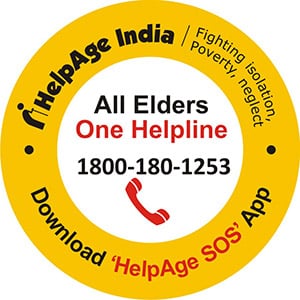The problem of old age is recognized as one of the most pressing issues of the current scenario. Given the significant jump in the elderly population in the coming years, in what is being called as the “Grey Tsunami”, our preparedness as a country is inadequate to say the least. Based on the World Health Organization (WHO) report in 2002, Elder Abuse has been categorized into three wide categories: first, neglect, including seclusion, social seclusion and rejection; second, abuse of legal, human and medical rights; and third, lack of choices, status, finances, respect and decisions.
India is home to one out of every 10 senior citizens of the world and elder abuse is a serious problem. Every year cases of elder abuse and criminal activity against the elders are reported in the media as elders are easy victims, lacking security and support. There are many cases which are not reported and the society remains in the dark regarding the atrocities done on the elders that are dependent or alone without proper care and safety.
Older people suffer more due to infirmity, illness, dementia, nutritional deficiencies, depression, loneliness and lack of financial security. The major reason for the elder isolation and neglect is because the migration of the younger generation from villages to urban areas in search of better opportunities and prospects. The elders suffer because of their dependency on other people for their survival and support when their own children neglect and isolate them. During disasters like floods, cyclones and earthquakes etc. too, rescue and relief for elders are again easiest to be ignored as they’re left behind!
According to the National Crime Records Bureau 2014 report, 18714 incidences of crime cases were reported against elders, increasing the overall rate of elder abuse to 18.3% in India. The elderly living in urban areas face more abuse as compared to those in the urban areas. Most of the elders face abuse and isolation from their own family due to lack of financial security and frailty.
 HelpAge India runs a Toll-free Elder Helpline all across India offering assistance to elders in need. The services offered are – rescue of abandoned elders, counseling of those in distress, health care, legal support, and information related to services available etc. The Helpline links elders to various institutions such as old age homes, hospitals, police, government and non-governmental organizations. Thousands of elder rescues are successfully conducted and the destitute seniors rightfully admitted to hospitals and old age homes as the case may require.
HelpAge India runs a Toll-free Elder Helpline all across India offering assistance to elders in need. The services offered are – rescue of abandoned elders, counseling of those in distress, health care, legal support, and information related to services available etc. The Helpline links elders to various institutions such as old age homes, hospitals, police, government and non-governmental organizations. Thousands of elder rescues are successfully conducted and the destitute seniors rightfully admitted to hospitals and old age homes as the case may require.
According to the survey conducted by HelpAge India in 2014, it was reported that about 52% of elder women are abused as compared to the 48% of elder men in the country. The current status of senior care in India is not very encouraging and although there are constitutional and legal provisions for the elders to live a life of comfort and dignity, the reports on the ground say otherwise. The Government passed the Maintenance and Welfare of parents and Senior Citizens Act in 2007 which makes it obligatory for children to take care of their parents and grandparents and yet, every day we hear stories of abuse against the elders.
There is a lack of awareness regarding the Maintenance and Welfare of parents and Senior Citizens Act of 2007, among the seniors and individuals and therefore it is difficult to provide help and assistance when needed. The United Nations celebrates World Elder Abuse Awareness Day on 15th of June every year to spread awareness and provide hope for the elders who are victims of abuse to find help and take action. HelpAge India marks the World Elder Abuse Awareness Day on 15th of June every year to show their solidarity and support for the elders in our country. This year’s theme is “Elder Abuse in India – Role of Family: Changes and Responsibilities”. The aim of the report is to study the obstacles of elder care in the family by the sandwich generation.
Elder care and support is an important issue and every individual should take this responsibility seriously. The younger generation should be made aware of the consequence of old age and also the role they play in providing support and care for their older parents and grandparents. The mind of the younger generation needs to be constructively framed to provide elderly welfare and protection.
“To care for those who once cared for us is one of the highest honors.”
― Tia Walker





